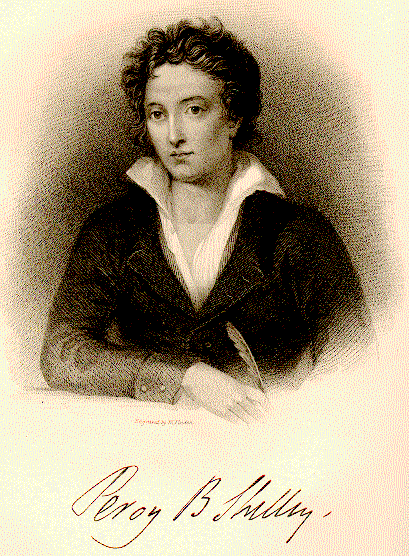Live and creativity of Percy Bysshe Shelley
Percy Bysshe Shelley attended the University of Oxford in 1810 but was expelled from it early in the following year because of the radical anti-clerical views he exposes in his brochure "On the Need for Atheism" (1811). In 1811, Shelley settled in Nottingham, where he began regular correspondence with the distinguished English thinker William Godwin, whose work "Investigating Political Justice" was read as a student in Oxford. In the same year he wrote the poem "Mother and son. A Tale of Real Reality ", in which he sets out his daring ideas of transforming society, largely influenced by Godwin's work. In 1813, Shelley's "Queen Meb" poem appeared, which was incredibly successful and made him a prominent talented poet. Between 1814 and 1848, his work was re-published in sixteen editions - an unusually literary-publishing event for that time. In 1816 the second masterpiece of Shelley's poetic work appeared, the poem "Alastor or the Spirit of Loneliness". It is written in white poems, penetrated by an ardent glorification of nature, and by pessimism brought about by the young poet's ideal idea of perfect love, which is hardly feasible in real life. Shelley's two short poems, "The Hymn of Spiritual Beauty," and "Mont Blanc," which Shelley created in 1816, are highly valued by his lyricist's connoisseurs. The first one is felt by Rousseau. The poet shares the enlightenments and revelations of the Spirit of Beauty that appears to him to relieve his over-fulfilled life with frustration and suffering. In the second one, the pantheistic ecstatic impulse that conquers Shelly stood in front of the magnificent alpine peak and felt a spiritual empathy with the omnipotent Nature. In 1818, Shelley's third remarkable poem "The Insurrection of Islam" was completed, a long, monotonous poem that impressed the creators' beautiful intimate confessions, but unmotivated artistically convincing scenes of bloodshed and horror suppressed reading.
Between 1820 and 1821, the historical tragedy "The Cenci", the poetic fantasy "The Atlas Wizard", the Adonis Elegy - the last honoring of his notorious contemporary, the English poet John Keats, the enthusiastic anthem "Eppsidion", the poem written in " Terma Rima "," The Triumph of Life ". In 1821 Shelley began writing his remarkable theoretical treatise, "Protecting Poetry," where he set out his views on the purpose of poetry, his place among other arts, the poet's mission, and the morally transformative role of poets in people's lives. Shelly's Aesthetic Views: It is not necessarily a great poet's necessity to be a sure and profound thinker. But Shelly belongs to the community of poets who have constantly confronted with the mysteries of being and have meditated unceasingly on the eternal problems of life. He is one of those creators who have been called to relieve people's torments and sufferings by exposing injustice, oppression, and tyranny. In his poems and poetry, this English poet feverishly and often naively reflects on the social, political and religious issues that bring disharmony into the life of man and society. Much of his work is filled with the pathos of instruction, which can only arise in a noble, generous and sensitive human soul. As a poet, Shelley struggled to enthusiastically establish and spread among the readers the principles on which he devoted himself to ardent devotion. His ambition as a pure, often lurking in the clouds, is idealistic to transmit experiences and feelings, to incite readers to experience them again and rethink through the mediation of dramatic situations, bright images, easily accessible symbols and exciting rhythmic finds. They attribute to him the fame of a second poet after Shakespeare, who has been able to extract incredible musical effects from the inexhaustible melody of English.
Love's Philosophy
The fountains mingle with the river,
And the rivers with the ocean;
The winds of heaven mix forever
With a sweet emotion;
Nothing in the world is single;
All things by a law divine
In another's being mingle-
Why not I with thine?
See, the mountains kiss high heaven,
And the waves clasp one another;
No sister flower could be forgiven
If it disdained its brother;
And the sunlight clasps the earth,
And the moonbeams kiss the sea; -
What are all these kissings worth,
If thou kiss not me?
Shelly felt the need to explain and clarify before the readers the presence and damage of evil in the world. According to him, if God is perceived, as almost all religions maintain, as concerned not only with the Good, but also with responsibility for the Evil in the universe, he should be denied by the people after he has allowed it. Explaining the presence of evil in the world through the biblical parable of the original sin seems childish to Shelley. In his life, he has repeatedly observed how innocent children suffer and die and can not justify their suffering and ridiculous deaths through the "transgression of Adam." Attracted by Godwin's radical social transformational ideas, he is indignant at the misery of the hired workers, the irreverence of the Irish, the exploitation of the wealthy citizens on the labor of poor peasants and craftsmen. He can not tolerate the torture imposed on the domesticated animals, confessing that he has not caused evil either to a serpent, to a bird or to an insect.

The university of Oxford in 1810 ......
is very important in my life. I want to study in this university.
Very nice :)
keep it up very nice post
thank you